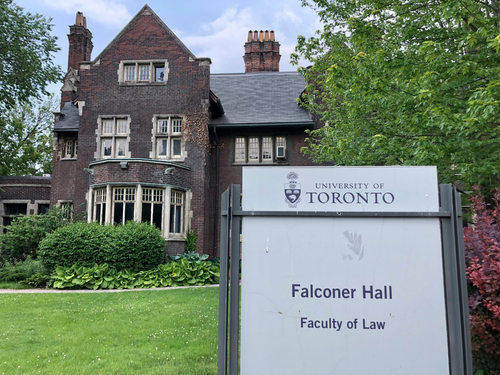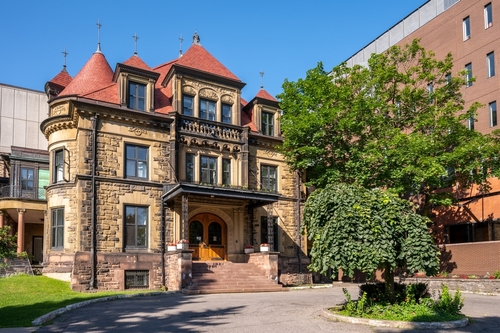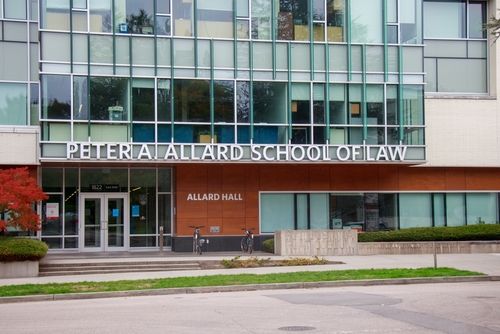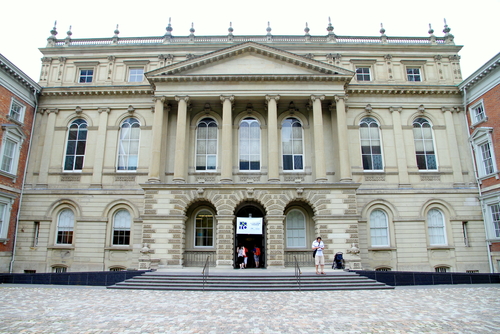Ever wondered which Canadian law schools can set you up for a successful legal career? While a legal education can be expensive, the growing demand for skilled professionals in law today makes it a better investment than ever.
Choosing the right school for your legal education is an important decision that will significantly affect your career—and your finances. That’s why we’ve created this guide at Remitly to highlight the top law schools in Canada and help you make an informed choice. We’ll outline admission requirements, program highlights, and practical tips for choosing the school that best fits your goals.
Understanding Canadian legal education
In Canada, becoming a lawyer usually starts with a four-year undergraduate degree, followed by a Juris Doctor (JD) in common law, or a Licentiate in Law (LLL) / Bachelor of Laws (LLB) in civil law if you plan to practice in Quebec. These typically take three years.
Canadian law is unique because it includes two systems: common law is practiced in most provinces, while civil law is used mainly in Quebec. Some schools combine these programs, so you can learn from both systems. Many schools also offer bilingual programs in English and French. This can expand your career opportunities, particularly in federal government roles or international law.
Canada’s common law programs are approved under the Federation of Law Societies of Canada’s (FLSC) national requirements.
To become a licensed lawyer in Canada, you’ll need to:
- Get a law degree from a Canadian university recognized by the FLSC
- Register in your provincial or territorial law society’s licensing process
- Pass the bar examinations
- Complete practical training, usually through articling (about eight to ten months) or an approved alternate program
- Meet the law society’s good character requirements
- Pay all required fees
- Be called to the bar in a formal ceremony and take an oath
These steps apply across Canada, but details may vary by province or territory.
Top common law schools in Canada
Whether you already live in the country or you’re considering moving there to study law, here are the best Canadian law schools:
University of Toronto Faculty of Law

The University of Toronto Faculty of Law is one of Canada’s most prestigious law schools, ranked 22nd in the Times Higher Education World University Rankings 2025. It attracts ambitious students from Canada and around the world.
The school offers practical training and a global perspective through clinical programs, research centers, moot court, advocacy training, and international exchanges. Graduates often end up in top positions in law firms, government, and international organizations. The school’s alumni include Supreme Court justices and influential policymakers.
Admissions requirements include strong grades, high Law School Admission Test (LSAT) scores, and a personal statement submitted through the Ontario Law School Application Service (OLSAS).
For 2025–2026, tuition is $35,150 CAD for Ontario residents, $41,500 CAD for other Canadian students, and $72,200 CAD for international students. Financial aid, scholarships, and bursaries are available to help manage costs.
McGill University Faculty of Law

McGill’s Faculty of Law offers a unique curriculum, teaching both common and civil law to prepare students for work across multiple legal systems. The school attracts a diverse student body from around the world and emphasizes global perspectives.
Faculty expertise in international law, human rights, and comparative law provides students with plenty of opportunities for research, journals, and specialized projects.
To apply, you’ll need to meet prior education requirements and have a working knowledge of English and French. Admissions considers motivation, extracurriculars, references, grades, LSAT scores, statements, and interviews, but they don’t have strict GPA or LSAT cut-offs.
For 2025–2026, tuition is $5,760 CAD for Quebec residents, $20,500 CAD for Canadian students and $59,000 CAD for international students. Financial support is available through scholarships, bursaries, and need-based aid.
University of British Columbia Peter A. Allard School of Law

UBC’s Allard is one of the top law schools in Canada for students looking for progressive, practical legal training. It has a strong reputation in environmental, indigenous, and business law, and offers specialization in areas that shape local and global policies.
You’ll gain hands-on experience through clinical programs and community initiatives, preparing you to tackle real-world challenges. You can also connect to a strong West Coast alumni network that opens doors to top law firms, government roles, and international opportunities.
Admission is competitive, typically requiring a median GPA of 84% and an LSAT score of 166 (93rd percentile). You’ll need to apply through UBC’s online portal and submit a transcript, a personal statement, and a fee.
For the 2025–2026 JD program, tuition is $14,200 CAD a year for domestic students and $45,900 CAD for international students. Scholarships, bursaries, and financial aid are available.
Osgoode Hall Law School (York University)

Osgoode Hall at York University is one of Canada’s largest law schools. It offers diverse programs ranging from tax law to intellectual property, allowing you to tailor your education to career goals. Located in Toronto, you can benefit from networking, internships, and work opportunities in Canada’s busiest legal hub.
If you want to balance education with work or family commitments, the school offers flexible full-time and part-time JD options. You can apply if you meet the eligibility requirements, which include LSAT scores, English proficiency, and letters of recommendation.
To apply, you need to have a minimum of three years of university education or five years of non-academic experience. For 2025–2026, tuition is $26,200 CAD for Ontario residents, $28,700 CAD for other Canadian students, and $45,800 CAD for international students, with scholarships, bursaries, and financial aid available.
Other notable law schools
Beyond the most well-known names, let’s look at some other law schools in Canada that are definitely worth considering.
University of Calgary Faculty of Law
This law school emphasizes energy, natural resources, and business law, preparing students for key sectors in Alberta’s economy. Its strong local legal market connections provide internships, networking, and hands-on experience with law firms, corporate legal departments, and government offices.
Admission is competitive, requiring a solid undergraduate record of at least 60 credits, an LSAT in the 84th percentile or higher, and a personal statement. The JD program combines classroom learning with practical skills, allowing you to specialize in high-demand areas while benefiting from a supportive environment.
Tuition for 2025–2026 is around $18,200 per year for Canadian students and $66,450 per year for international students.
University of Alberta Faculty of Law
This school offers a variety of specializations, including law and technology or indigenous legal studies, allowing students to tailor their education to career goals.
Research centers and clinical programs provide hands-on experience through projects, legal clinics, and community partnerships, which can help you build practical skills.
Admission requires strong undergraduate grades, good LSAT scores, and a personal statement, which may highlight community contributions or personal or professional achievements.
The estimated 2025–2026 tuition for the JD program is $19,700 CAD for Canadians or $57,200 CAD for international students. Scholarships, bursaries, and financial aid are available.
Dalhousie Schulich School of Law
This school of law specializes in maritime and indigenous law, reflecting Atlantic Canada’s legal environment. Students gain practical experience through internships, clerkships, and networking with regional law firms, government agencies, and organizations. These connections build local and national career opportunities.
The program blends classroom learning with hands-on training. Admission is competitive, based on undergraduate grades, LSAT scores, personal statements, and letters of recommendation. Tuition for the 2024–2025 academic year was approximately $22,500 CAD for Canadian students $42,900 CAD for international students.
Choosing the right law school for you
Wondering how to choose a law school in Canada? Here’s a checklist for decision-making:
- Location and regional legal markets: Choosing a school near a strong legal hub can give you access to internships, clerkships, and networking events. Your school location often influences the opportunities available after graduation.
- Specialization areas and faculty expertise: You want to pick programs that match your interests. So select schools with renowned faculty in business, indigenous, or environmental law, depending on your passion. These specializations will give you an edge in your future career.
- Clinical programs and experiential learning opportunities: Hands-on experience is essential in law. Choose schools that offer legal clinics, moot courts, and community projects. They provide practical skills that can set you apart from other graduates.
- Alumni networks and career services: Strong alumni networks and dedicated career support help you find internships, mentors, and job opportunities. Make sure the school is accredited, as this is essential for your legal career.
- Explore scholarship and bursary options: Consider scholarships, bursaries, and potential post-graduation salaries to ensure your investment aligns with your career goals.
Application strategy
A well-planned application can make the difference between acceptance and rejection.
- Timeline for applications and key deadlines: Start early. Most Canadian law schools accept applications through OLSAS or their own portals, with deadlines as early as the fall or winter before your intended start. Tracking key dates helps you avoid last-minute stress.
- LSAT requirements and preparation tips: The LSAT is a critical part of your application. Aim for a score at or above the school’s median. Consider taking preparation courses, and dedicate several months to studying before taking the exam.
- Personal statement and reference letter guidance: To meet Canadian law school requirements, your personal statement should highlight your motivation, leadership, and relevant experiences. Ask for references from people who know your strengths and give them time to write detailed, supportive letters.
- Interview preparation: Some programs require interviews. Treat them like a job interview—practice your answers, know your application thoroughly, and show genuine enthusiasm for the school and its programs.
Financial planning
Getting your finances in order early can make law school more manageable.
- Compare tuition costs across provinces: Law school costs in Canada vary widely. Check tuition for each school and province to find the best fit for your budget.
- Consider living expenses in different cities: Housing, food, and transportation can add significantly to your costs. Factor in living expenses when choosing a school.
- Student loan options and debt management: Compare federal, provincial, and private loan options for law school admissions in Canada. Plan repayment strategies and consider your potential post-graduation income to manage debt responsibly.
Career outcomes and bar admissions
Most Canadian law graduates find work shortly after their studies, with about 65% holding two or more positions since graduation. Salaries vary by region, practice area, and experience, with entry-level roles at large firms often paying more than government or non-profit positions. The best Canadian law schools usually provide networking opportunities through mentorship programs and career fairs to help you get started in your professional journey.
Start your legal education journey today
Selecting a law school shapes your career, so weigh factors like location, specializations, hands-on learning, alumni networks, and costs. Research programs, visit campuses, and explore official school websites and application portals to get a good feel for your options. Talking to current students or alumni can also provide valuable insights.
Remember, the best law school isn’t necessarily the highest ranked—it’s the one that fits your goals, interests, and circumstances.
FAQ
What are the admissions requirements for Canadian law schools?
Most schools require a strong undergraduate record, an LSAT score, a personal statement, and letters of recommendation. Some may also ask for interviews, bilingual proficiency, or evidence of relevant experience.
How much does law school cost in Canada?
Tuition generally ranges from $14,000-$37,000 CAD annually for Canadian students, and $45,000-$70,000 CAD for international students. Additional costs include books and living expenses.
Can international students attend Canadian law schools?
Yes. International applicants have to meet the same academic and LSAT standards as domestic students and often need to provide proof of English proficiency. Tuition is higher, but some financial aid and scholarships are available.
What’s the difference between JD and LLB programs in Canada?
The JD (Juris Doctor) is a degree in common law, which is practiced across Canada except for Quebec. In Quebec, you can prepare to practice civil law by studying an LLL (Licentiate in Law) or LLB (Bachelor of Laws).
How competitive is admission to top Canadian law schools?
Highly competitive and top law schools in Canada favour applicants with excellent grades, high LSAT scores, strong personal statements, and relevant extracurricular or professional experience. Some also consider leadership, community service, or interviews.
